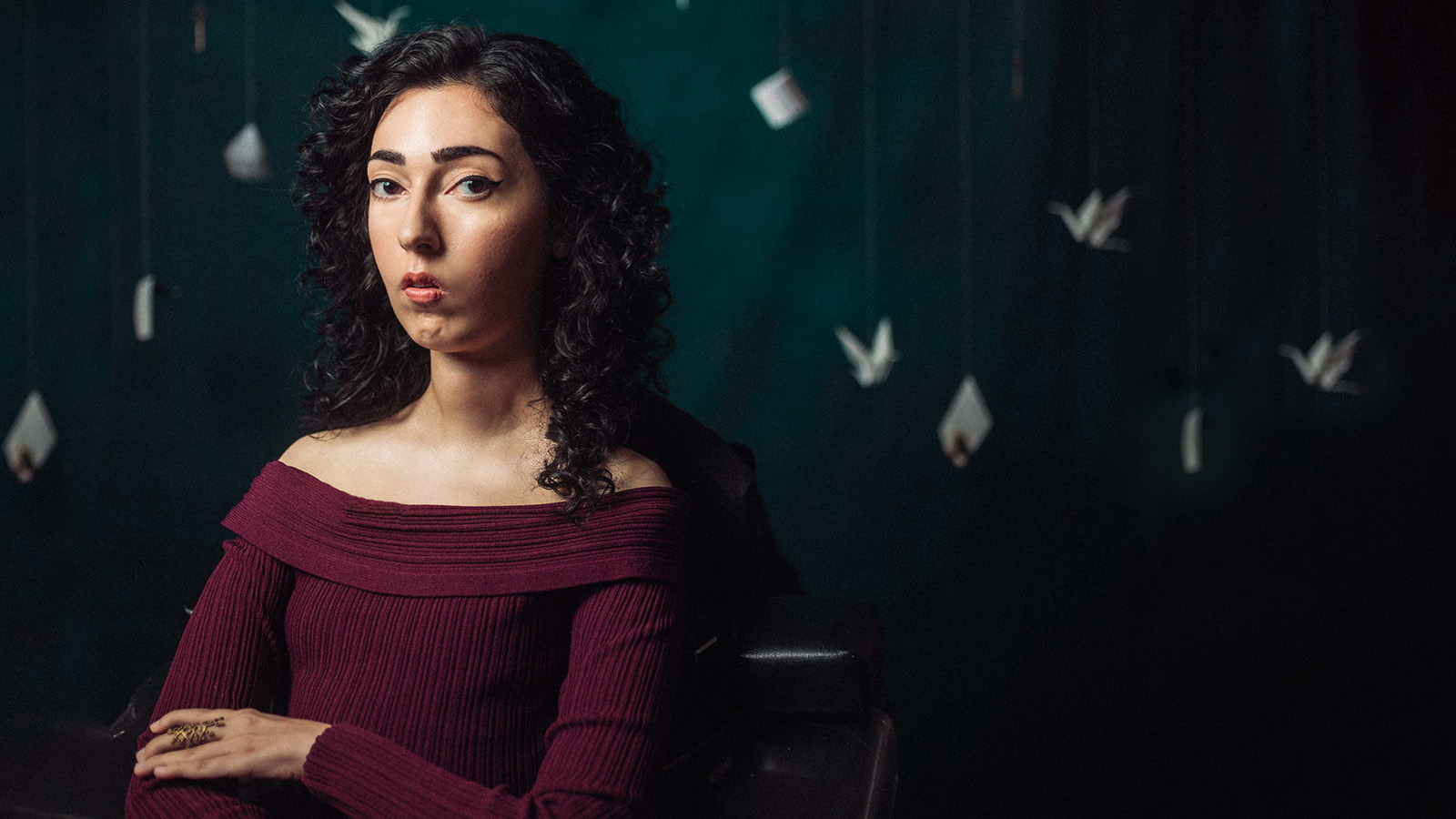
Image from Sirens music video. Cinematography: Kevin J. Thomson. Make-up and Hair: Suzanne Christie. Art Direction: Jonna Laitinen.
Kiana Kalantar-Hormozi has an impressive body of work in music, filmmaking and disability rights activism that has earned her national press attention, titles like MDUK Campaigner of the Year 2018 and one of the 30 Under 30 most inspirational women in 2017.
No one would tell you that pursuing a career in music is easy, but Kiana’s determination is rooted in a passion for creativity and a love of music that drives her beyond the barriers that litter the path of any aspiring music artist.
Supported by funding from the National Lottery through Creative Scotland’s Open Fund as well as Edinburgh Napier’s Enterprise Hub Bright Red Triangle, Kiana released her debut single Sirens in July which has since been featured on radio stations across the country.
It’s clear the only way is up for Kiana – so how did she do it? Here are Kiana’s top 5 tips for creating your debut single.
1. Plan your journey and be determined
I’ve always known that I wanted to be a singer-songwriter since I was 8 years old, but I was taken aback by the discrimination I faced when trying to pursue this passion throughout my teenage years.
I was simply told that there was no one like me in mainstream music or media and that following a music career professionally “couldn’t be done” no matter how much I exceeded expectations. It took me a decade to realise that I had the power to build my own path. And that’s exactly what I’m doing now.
Your debut single is the first step towards a long and successful career. So before you even write the track, think about how it will fit into the bigger picture and how the song will reflect on you as an artist – it’s important to plan for maximum effect.
I’ve had a lot of time to come up with a 2-year and 5-year plan, as well identifying my ultimate career ambitions – shoutout to Viana Maya from Prespect for her excellent coaching on mindset and career plans!
Sirens was the very first step, but before the song was even fully written I knew exactly what my next actions would be.
2. Practice obsessively and experiment unapologetically
They say that practice makes perfect, and I believe this is true. I am not a ‘naturally talented’ performer and I also don’t believe that ‘naturally talented’ performers can get far without real hard work.
When you hear amazing vocalists and performers, it’s always about the magic onstage. You don’t often see the behind-the-scenes process, you don’t hear singers on their worst days so it’s important to hone your craft and to be your own harshest – and kindest – critic.
For me, practice and technique are crucial to offsetting the difficulties I have with my muscles. When I do my exercises, my breathing and jaw mobility improves, and I can get away with less practice and sing more intuitively!
I’d recommend that you make a safe practice space and give yourself the opportunity to make mistakes. Use your voice, instrument or creativity in a way you haven’t before.
Make sure to record and document your practice. It’s awful listening back to yourself when you’re not happy with the performance, but objectively listening makes all the difference. And then eventually, as you improve, you’ll listen back and think “wow, that was me!”
Your debut single is a chance to make an impression. It won’t be perfect though, so don’t get stuck being a perfectionist.
3. Find investors and invest in yourself
I had to think about the investment required to get my career off the ground, and how I could eventually make a return on the investment.
Before Sirens, I had no examples of my work. I had done a fair bit from the ages of 11 to 17, but I didn’t appreciate the importance of documenting my voice or having demos.
With no examples of my previous work and with my voice in recovery, I had to invest my own money to purchase basic recording equipment and pay for production. This was a start. I could then demonstrate my song-writing abilities, my voice and my vision for the track to potential funders.
I applied to Creative Scotland’s Open Fund with a demo for funding to create the images for my single. From my experience in film and media, I knew the importance of creating an ‘image’ for my audience and the funding meant I could work with my dream team.

Image from Sirens music video. Cinematography: Kevin J. Thomson. Make-up and Hair: Suzanne Christie. Art Direction: Jonna Laitinen.
Later I pitched at Edinburgh Napier’s Bright Red Triangle event and won some money to promote the single with professional PR. It was really important to make maximum impact with the debut and find ways for audiences to discover me – because I had no following for my music and less than 5 industry connections!
Like any business, it will take time to make profit and see growth. Until then you need people who will believe in you and want to invest.
Try to speak to funders, build a relationship and get advice on your plans. Funding opportunities like the Open Fund are so important in levelling the playing field and kickstarting long-term careers.
4. Find amazing collaborators and mentors
This bit is easier said than done – find your people!
Not just people from your industry, but your people. People you can work with, people who will push you. There has to be mutual respect, drive and excitement for the goals you’re trying to achieve.
For Sirens, my main collaborator was my Producer, Axel Goodboy, who I’d worked with before on a film project. It was important to communicate and find the best way of working internationally online. In the end, it was a total success and I think the pandemic has made me realise it is possible to do this type of collaboration remotely.
I’m incredibly privileged to have had amazing tutors, teachers and mentors throughout my entire life, not just in music. So I was excited to work with my vocal tutor, Petra, to build my voice and work on techniques to develop as a vocalist.
No matter how talented you are, you can’t create art by yourself in a vacuum away from other people and make it a success- Kiana Kalantar-Hormozi
5. Connect with audiences and take care of yourself
Debuting came with the understanding that I needed to actively pursue media attention. It was important to take some time beforehand to think about how I could connect with my audiences.
But I also had to think – what are my boundaries? How do I dodge uncomfortable, personal questions or deal with online trolls?
I am in no way famous. Yet. But a few years ago, I was getting recognition for my film and activism work which led to some mainstream media attention. I was utterly unprepared for the impact it had, whether dealing with online trolls or getting recognised in my local area when I was ill sitting in the GP reception area.
So before Sirens came out, I spent a lot of time thinking about how I would engage my audience and get them invested, but also how I would protect myself.
I always want to keep it real. My creativity is often inspired by personal life events, or experiences. But now I also know I’m allowed to enforce boundaries that are essential to my well-being.
Ultimately, wanting to have a public image does not mean you consent to every detail of your life being broadcast or dealing with online hate. You have to learn to take care of yourself and have a well-being plan in place.
Sirens is out now! Listen on your favourite platform.
